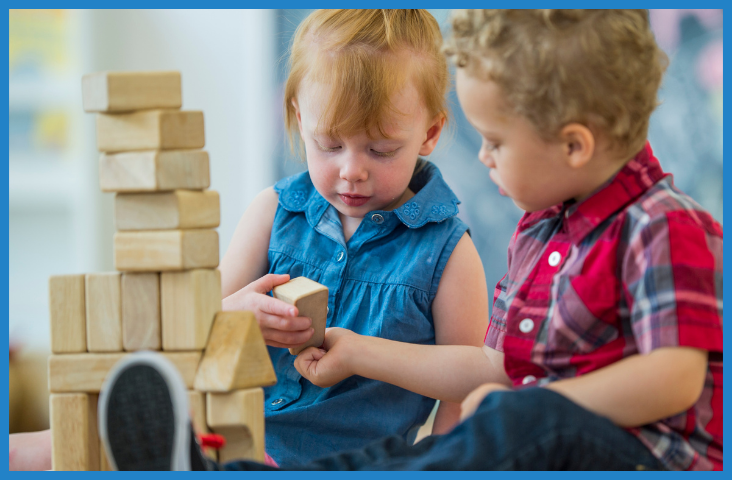
It’s time to rethink sharing
Every parent I talk to wants to raise kids who are kind, generous, thoughtful, and considerate of others. So naturally, we try to encourage our children to do things like sharing their toys, taking turns on the playground, and offering up their sweets to others.
When our children refuse to share with others, we worry that we’re not doing a good job of raising kind children. Because no one wants to be the parent of the kid that snatches toys from others or refuses to share at playgroup, right?
So we try to teach our kids to share their toys. We encourage them to hand their doll over when someone else asks for a turn. We set timers. We decide when a child’s turn is over. And amidst a cacophony of protests, we pry those beloved toys from their little hands and give them to other (often crying) children when they ask for a turn. All in the name of “teaching” them to share.
But is that actually what we’re teaching?

Forced sharing is not really sharing at all
When we force children to share in this way, we are certainly teaching them some lessons. But probably not the ones we intended to
Forced sharing, or forced, timed turn-taking is not really sharing at all. Think about it. How often as an adult do you hand something over to someone else simply because they asked for a turn? Do you willingly hand over your phone just because someone asked for it? Do you let them take your car out for a drive? Do you give them your new handbag?
You don’t, right? That would be ludicrous. But this is what we expect children to do when we tell them to “share”. Sure, their toys may not be as valuable as our adult stuff, but they’re still valuable to them. And they deserve to have a say about how and when they share them with others.

What forced sharing teaches kids
Forcing kids to share makes it an unpleasant experience for them. It can create children who try to please others at all costs, as well as children with a sense of entitlement and an inability to control their impulses or delay gratification. Not exactly what you’re aiming for as a parent right?
Let’s take a closer look at what kids are really learning when we force them to share.
The child forced to share learns:
- The needs of others are more important than my needs
- People who are bigger than me can force me to do what they want
- I have no voice and cannot say no
- I should do what others want in order to keep them happy
- I am powerless
The child who wants the toy learns:
- My needs are more important than the needs of others
- I don’t have to wait – others should give me what I want when I want it
- If I complain loudly I can get what I want
- Other people should make me happy
- I can force people to do what I want
So you see, when we take this approach with children, we create resentment, entitlement, and competition. We rob children of opportunities to truly engage deeply and meaningfully in play which is vital for healthy development. And we teach children that they have no agency or autonomy – that parents can force them to do what they want when they want.
This is not a formula for the development of healthy peer, sibling, or parent-child relationships. It also doesn’t actually promote social and emotional skill development. If anything, it delays healthy social development because it makes sharing a dirty word.

A new approach to sharing
So what do we do instead of forced sharing? We allow children to choose for themselves when their turn is over. Rather than encouraging the child playing to hand over their toy, we encourage the child who wants the toy, to wait. And we support the waiting child when big feelings inevitably come up.
To the child with the toy, we say, “Johnny would like a turn when you’re finished. When you’re done playing with the truck please give it to Johnny.”
And to the child who wants a turn, we say, “Marco is playing with the truck right now. He will give you a turn when he is finished. I know waiting can be hard sometimes, so let’s do something fun together while we wait?”
And that’s it. The child playing will eventually choose to give the toy to the waiting child. And because it was their choice to share, it will feel good to them. There will be no resistance, no resentment, and no rivalry!
Here’s what the children have learned this time:
- I am in charge of how long I play for
- I have a voice and the grown ups around me will listen to me
- Being kind to others feels good
- I can make choices that help others feel good
- Waiting is hard – but I can do it!
- The adults in my life understand me and will support me when I have big feelings
- Other people are kind and generous
- I am a kind and generous person who gets along with others
When we give children choice and autonomy, they will rise to the occasion. They will learn that being generous and sharing with others feels good. And they will feel good about themselves. They will develop a belief in their own goodness, and in the goodness of others.

Sharing is a developmental skill
While this approach might feel uncomfortable at first, it does work. But it’s important to remember that just like walking, talking, tying shoelaces, or reciting the alphabet, sharing is a developmental skill. A child’s ability to share or take turns develops slowly over time and is linked to their brain development and maturity. It requires children to have some degree of empathy and to be able to understand and respond to the needs of others.
We can help them along and support the development of these skills by giving children lots of opportunities to practice sharing. And when we allow children to choose the generous, kind response for themselves (instead of forcing them into it) they learn that it feels good. If they have a positive experience of sharing – an experience they feel they have control of and choice about, they will be more likely to do it again. And again. And again. No force required.
Sarah Conway is a child and adolescent psychologist, mother of 4, and founder of Mindful Little Minds. She has over 15 years of experience working in mental health with children, teenagers, and families. Sarah’s mission is to help parents move away from punitive parenting strategies and towards mindful, intentional parenting that builds emotional intelligence in kids and parents alike. As a busy mum herself, she knows firsthand how difficult mindful parenting can be, particularly when it was never modeled by our own parents. That’s why she provides parents and children with simple, practical strategies and tools that help them learn to manage emotions – together. She believes that changing the way we parent will change the world.


